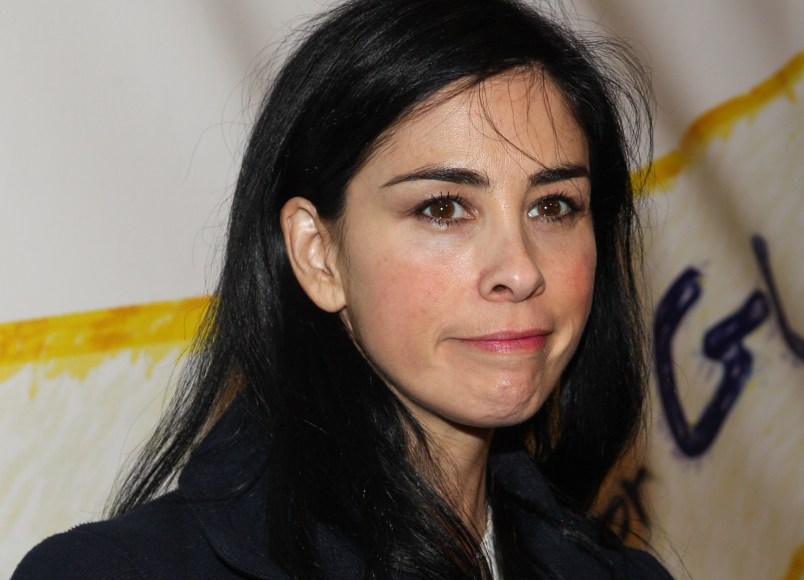Variety TV critic Brian Lowry, in a piece entitled “Sarah Silverman’s Bad Career Move: Being as Dirty as the Guys,” warns that she is “veering into bad taste territory.” in her latest HBO special “We Are Miracles,” which airs tonight.
Such a critique might be appropriate on a performance review at the office, but, if your job title is Comedian, a preponderance of the evidence would suggest that veering into bad taste territory is actually, in fact, a job requirement. (See: pretty much every professional male comedian ever.)
But not if your title is Comedienne, apparently.
Because god forbid a woman should be dirty. A little soil, tastefully applied, is okay, but a lady should only go so far. Tsk tsk! Not as dirty as the boys, please! We like our women sweet, demure. Self-deprecating is okay (particularly if you’re smart, pretty, successful, or otherwise enviable or intimidating); a joke here or there might even be passable, but a lady never shocks.
And an attractive woman? Such a pity to see good looks wasted on a woman with a mouth! You’re kind of pretty, so please, please don’t ruin your bedability by being as dirty as the guys.
As Lowry wrote: “There’s something simultaneously fascinating and maddening about Sarah Silverman–graced with genuine talent and a well-defined comedic persona on one hand, and a commitment to pushing past the edge in a way that blunts her appeal on the other. Despite all manner of career-friendly gifts–from her looks to solid acting chops–she’s limited herself by appearing determined to prove she can be as dirty and distasteful as the boys, an attribute very much on display in her HBO special…”
“Appearing determined.” Lowry may be right. Her entire schtick may be contrived, designed to show those boys that she can roll around in the muck, too! It may be survival strategy: after all, comedy is a man’s world, and, like the women infiltrating the board rooms decades ago in their shoulderpadded power suits, perhaps there’s a measure of safety to be found in blending in. Why not try to beat them at their own game, out-dirty the dirty ol men?
Or maybe … she just thinks her stuff is funny.
But a woman’s choices must never be taken at face value! And by putting herself out there, a woman is offering herself for judgment. And she’ll be held to a different set of standards.
And society just doesn’t know what to do with a woman like Sarah Silverman: funny, foul-mouthed, successful, unmarried, childless, and–gasp!–42 years old. She shouldn’t be making jokes, the woman should be apologizing!
Months before, during Comedy Central’s Roast of James Franco, the clever theme the roasters uniformly embraced in their torching of Silverman? Her age. As Jonah Hill, who wasn’t the only one who latched onto the too-old-to-make-milk teat, said, “People say it’s too late for Sarah to become successful in movies at her age. I do not agree. It’s not impossible. I mean, it’s not like they’re asking you to bear children or anything like that.”
Hilarious.
While roasts are obviously not an immediate corollary to daily life, it’s interesting how her age was identified as something worth mining when the roasters were writing their sets. One might wonder if, when comics are writing bits directed at, say, a 42 year-old man, said comics would even register the man’s age, no matter how barren the landscape of details at which to pick. One might wonder whether said comics would think to mock a dude for not having kids.
But a woman of 42 who doesn’t have kids? In the realm of the roast, comic gold, apparently. And society? Well, society finds dealing with such a woman uncomfortable, wrings its hands. What to do with her?
I find myself pondering the saga of Sarah because it all rings so familiar. Many of my female friends worry about their age, what milestones they’ve hit and when it will be “too late” for them, while my male friends just … don’t. Even worse than being old may be looking old: and, oh the time that gets devoted to worrying about this. In my less generous moments I can’t stop from wondering: How much of the best years of our collective lives have we squandered worrying about our age, without realizing while we’re doing it that right now, in this moment spent worrying about getting (or looking) old, we are the youngest we will ever be? (And while we’re at it: how many of our worry lines are caused by such fretting?)
In the Sarah Silverman story, I see my female friends, coworkers, and acquaintances, and wonder how often they rein themselves in, ratchet their personalities down a notch, refuse to speak up or act out or really put themselves out there, re-calibrating according to an underlying, unspoken and subtle–yet constant and insidious–concern over what people will think, because they know they will be judged–in a way that men don’t, and aren’t.
What we talk about when we talk about Sarah Silverman is a woman’s place, what we expect of women, what a woman should be, what to do with the women who somehow break the mold.
And so I submit that Silverman–this foul-mouthed, unmarried, childless, 42 year-old woman–is a mirror. And so are the men who roast her, and the critics who write about her work.
The New York Times’ Maureen Dowd even devoted her column to Silverman recently, quoting her talking about the roast (and copping to having her feelings hurt) on W. Kamau Bell’s TV show “Totally Biased.”
Dowd writes that “Silverman told Bell that ‘as soon as a woman gets to an age where she has opinions and she’s vital and she’s strong, she’s systematically shamed into hiding under a rock. And this is by progressive pop-culture people!'”
Or clueless (white, male) TV critics.
Shannon Kelley is a writer and author based in California who writes frequently on the intersection of feminism, pop culture and politics.






